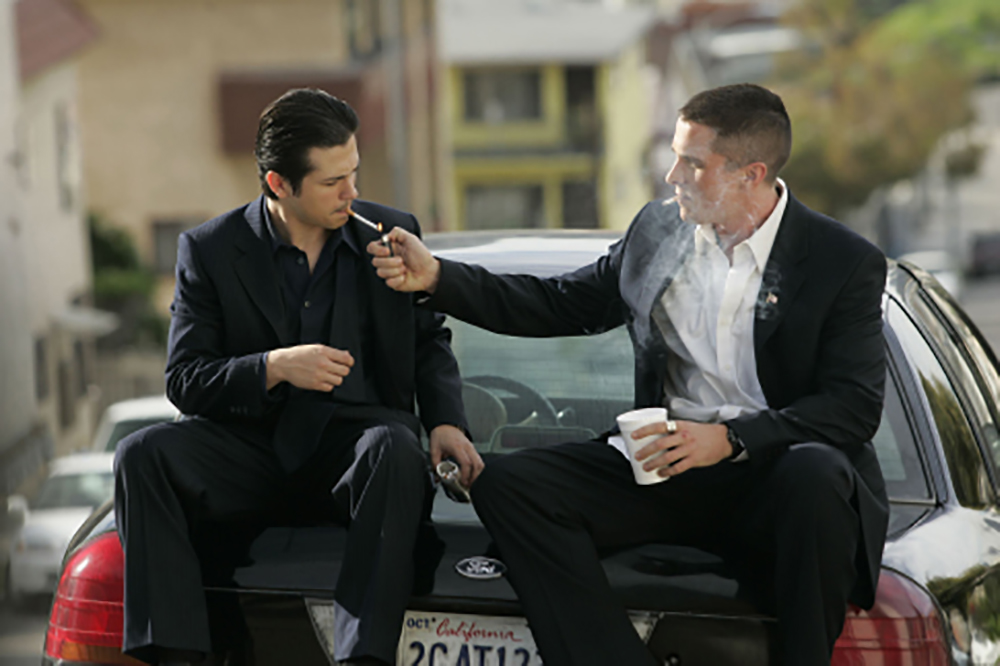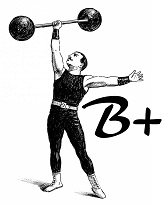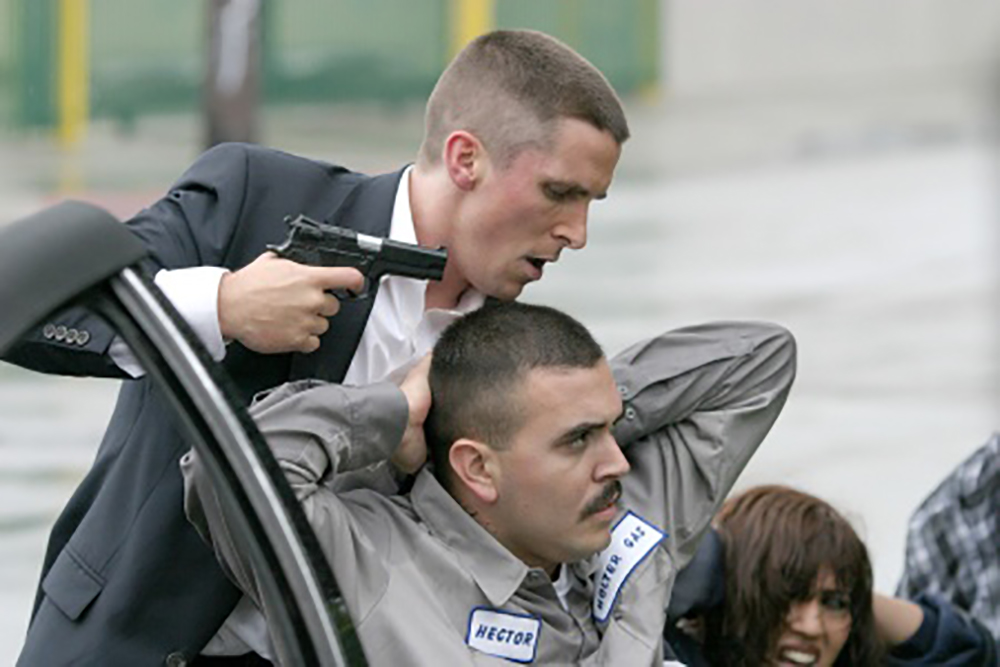While the jury is still out on a ‘nice guy’ award for actor Christian Bale, there’s no arguing he’s one of the most dynamic actors to come out of the last decade or so. Bale brings his roles to new heights, mixing method acting with a realness of character so profound, audiences often don’t recognize him from one movie to the next. While playing Bruce Wayne/Batman in Christopher Nolan’s recent trilogy consumed his recent work, a series of past, bizarre performances left a mark. Among these Patrick Bateman in “American Psycho,” Trevor Reznik in “The Machinist,” (which Bale lost an alarming 63 pounds for), and Dieter Dengler in “Rescue Dawn.” They earned Bale major acting chops and spearheaded a legion of online articles with a common theme: Does Bale take his roles too seriously?
If he does, there can be no better case study for this defense than his role in the 2005 drama “Harsh Times,” by Director/Writer David Ayer. “Harsh Times” is a psychological mind-trip, a film, like the recently released “Killer Joe,” that ran the risk of fading into b-movie banality were it not for the performance its lead brings to the table. Led by Bale, “Harsh Times,” while by no means a perfect movie, manages to be an engrossing character study of a man whose unstable post-war psychological state threatens to overtake him as he attempts to reintegrate into normal life.
War and dreaming of a way out
Bale plays Jim Davis, an ex Army Ranger who moves back to L.A. with the goal of landing a job as a police officer and marrying his beautiful Mexican girlfriend (Tammy Trull). Once back in the U.S., Davis reconnects with an old friend, Mike Alonzo (Freddy Rodriguez, “Poseidon”), who is living with his girlfriend Sylvia (Eva Langoria). Bumming around L.A., the duo find trouble from one spot to the next as Alonzo plays willing sidekick to Davis’ growing pathos. The two score beers and some pot (which Davis simply steals from a dealer), and see a gang banger chased through town by a shooter and other perils. The duo ultimately spends the rest of the day getting intoxicated and cruising through town, riding the outskirts of a city that threatens to consume them at every turn.
“Harsh Times” paints a decisive picture of L.A., reminiscent of the look of Antoine Fuqua’s “Training Day,” (also written by Ayer), showing a world of drugs, crime, and murder, which underscores the pair’s often-reckless path. At the same time, it hints—dangerously—at a past Davis longs to forget. Their carousing is a welcome respite for Davis, though all Alonzo wants to talk about is the war, needling him with questions of what it feels like to kill someone—which it is clear Davis does not want to talk about. However, a meet-up in a seedy bar only escalates this, as a man is viciously knifed before their eyes. Alonzo is horrified, and can’t stop shaking. Davis, however, is calm, excited, and frantic. The effect of war upon a man who no longer has the capacity to become horrified at death is both singular and harrowing.
Bale in absolute top form
Though an unsung movie that only garnered a $3M profit worldwide, “Harsh Times” is possibly Bale’s best performance to date. It’s a movie that involves the audience so silently down its protagonist’s decline you won’t realize until it’s too late. While no means innocent, Davis represents a victim of the horrors of war, illustrated the more by the shady-yet-meek baseline portrayed by Alonzo during the film. There’s an off switch Alonzo has which Davis does not, shown most expertly when Davis finds out he was rejected by the LAPD. It’s a scene which starts as a calm reading of a letter, but which quickly escalates into blind rage. Davis leaps out of his car, hurling a beer bottle at an innocent bystander in-between expletives and death threats. It’s not acting; it’s transformation: Bale doesn’t deliver lines but rather becomes Davis, a result that is both awe-inspiring and terrifying to behold.

Though less dynamic, other actors such as Freddy Rodriguez and Chaka Forman, (who plays the pair’s friend Toussant), add depth to the film and do a good job with the often-tricky material they have to work with. Special note should be given to Langoria, however, who, playing a woman fighting for Michael’s life as he is pulled deeper into Davis’ world, turns in an above-average performance and shows some real acting chops outside the soap opera that launched her career. However, we quickly see that Toussant and Alonzo are fighting for Davis’ life in similar ways. His descent into madness is more reminiscent of addiction than mental illness, until his friends realize their only course of action may be to distant themselves from him as he continues to self-destruct.
Detailing the horrors or violence and war
“Harsh Times” is a dynamic movie; it is one of those films you watch and then have to walk outside, take in a breath of fresh air, and remind yourself was just a movie. Some scenes are comical, while others fluctuate between poignant, disturbing, or hopeless. It paints a realistic, if over-the-top picture of a man damaged by the horrors of war, a good deal of action, and a performance by Bale that puts to shame the accolades garnered by his performance as the Dark Knight. The film’s a definite recommend, but a recommendation that comes with a warning: expect to see an engrossing movie but not a friendly one. “Harsh Times” is a movie of victims and every-men, with the audience tasked with deciding on what side its luckless protagonists ultimately fall.



2 Comments
This films does make you think.
Pingback: » Out of the Furnace (R)